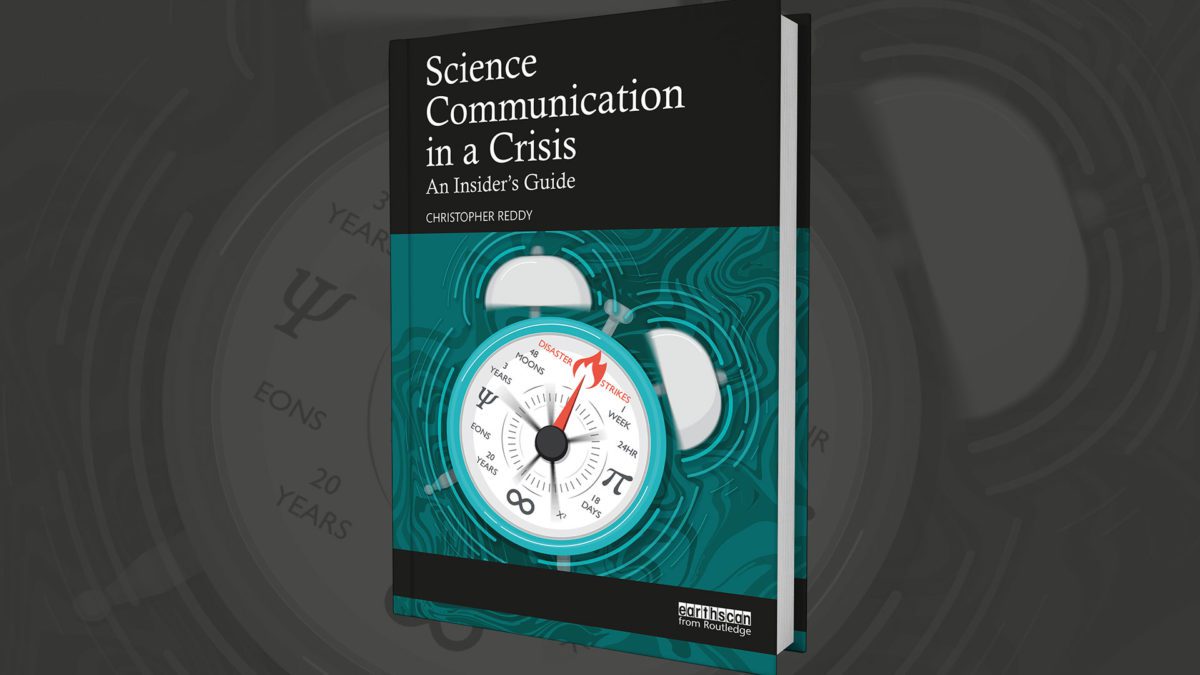WHOI Marine Chemist Shares Hard Won Advice for Communicating in the Face of Environmental Disasters
 Science Communications in a Crisis: An Insider’s Guide draws on decades of experience from Woods Hole Oceanographic Institution’s marine chemist Christopher Reddy. (Book cover design by Natalie Renier, Riley Orlando ®Woods Hole Oceanographic Institution)
Science Communications in a Crisis: An Insider’s Guide draws on decades of experience from Woods Hole Oceanographic Institution’s marine chemist Christopher Reddy. (Book cover design by Natalie Renier, Riley Orlando ®Woods Hole Oceanographic Institution) May 10, 2023
Science Communications in a Crisis: An Insider's Guide draws on decades of experience
Woods Hole, Mass. — A new book by Christopher Reddy, marine chemist at Woods Hole Oceanographic Institution (WHOI), identifies the principal challenges that scientists face during an environmental disaster when communicating with different stakeholder groups, and offers advice on how to navigate the maze of competing interests and deliver actionable science when the clock is ticking. Science Communications in a Crisis: An Insider's Guide (Routledge; May 10, 2023), draws on Reddy’s decades of experience and offers his hard-won advice from the front lines of environmental disasters.
Through multiple high-profile case studies including the Deepwater Horizon and North Cape oil spills, and the 2021 Sri Lanka shipping disaster, Reddy unpacks ten specific challenges scientists face when interfacing with the public and the media. “My aim for writing this guide is not to explain how to ace an interview or craft a sound bite, but rather to offer a clear pathway to effective and collaborative communication when multiple groups are involved,” Reddy said. “There are the responders, people affected by the event, the media, policymakers, industry, concerned citizens, and organizations; each category has its own goals, needs, and challenges, which scientists must understand in order to navigate them.” As Reddy outlines, if a scientist’s goal is to deliver content and expertise to the people who need it, then other stakeholder groups—the media, the government, industry—need to be considered as partners to collaborate with to solve problems.
As the planet faces increasingly frequent and devastating climate disasters, with the ever-present risk of another pandemic, and as the spread of misinformation is turbocharged by Artificial Intelligence, it is imperative that experts deliver trustworthy and actionable information.
According to Reddy, “while you may not be an oceanographer or a chemist, the communication challenges that I’ve faced can be lessons to anyone called on to provide an expert perspective. In communicating science with the outside world, we can share our unique, often first-hand expertise in a way that resonates and helps people understand what has happened, and what is at stake. A crisis can be a disaster, but it can also be an opportunity to close a knowledge gap.”
Science Communication in a Crisis: An Insider’s Guide is available now. Published by EarthScan from Routledge, illustrations by Natalie Renier, Riley Orlando.
###
About Woods Hole Oceanographic Institution
The Woods Hole Oceanographic Institution (WHOI) is a private, non-profit organization on Cape Cod, Massachusetts, dedicated to marine research, engineering, and higher education. Established in 1930, its primary mission is to understand the ocean and its interaction with the Earth as a whole, and to communicate an understanding of the ocean’s role in the changing global environment. WHOI’s pioneering discoveries stem from an ideal combination of science and engineering—one that has made it one of the most trusted and technically advanced leaders in basic and applied ocean research and exploration anywhere. WHOI is known for its multidisciplinary approach, superior ship operations, and unparalleled deep-sea robotics capabilities. We play a leading role in ocean observation and operate the most extensive suite of data-gathering platforms in the world. Top scientists, engineers, and students collaborate on more than 800 concurrent projects worldwide—both above and below the waves—pushing the boundaries of knowledge and possibility. For more information, please visit www.whoi.edu
Christopher Reddy is a leader in the study of marine pollution and the development of environmentally friendly industrial chemicals. A senior scientist in the Department of Marine Chemistry and Geochemistry at Woods Hole Oceanographic Institution and faculty member of the MIT/WHOI joint program in oceanography, Reddy has led numerous field operations along coastlines, in the open ocean, and at the bottom of the sea to conduct transformative research that crosses disciplines and guides policy decisions worldwide.
The reviews are in for Science Communication in a Crisis: An Insider’s Guide:
As a boots-on-the-ground scientist with an active research lab, Reddy’s voice is one that many of our colleagues will identify with. This insider’s perspective fills a gap in the lineup of existing science communication books." - Andrew Dessler, Director, Texas Center for Climate Studies; Reta A. Haynes Chair in Geosciences, Texas A&M
"Communicating science in a crisis is risky and challenging but incredibly important. This book is generously packed with decades of experience and wisdom from the front lines that can make us all better communicators in times of need. A must for every scientist’s bookshelf."- Dr. Asha de Vos, Founder/Executive Director, Oceanswell, Sri Lanka
"Focusing on how science communication transpires in real time, Reddy’s insight from the trenches of recent environmental crises provides scientists with a blueprint for success with a range of stakeholder groups, from responders to the affected public." - Barbara Sherwood Lollar, Dr. Norman Keevil Chair in Ore Deposits Geology, University of Toronto
